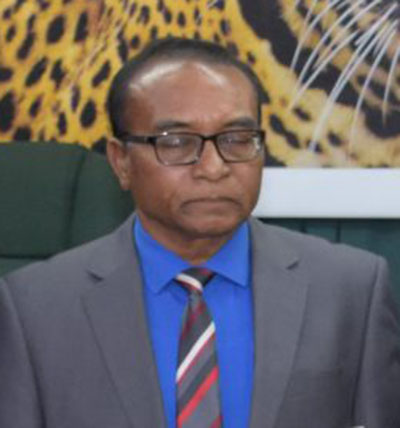The Integrity Commission incurred unexpected expenses this fiscal year and this hampered its ability to publish names of delinquent public officials, the Chairman of the body Kumar Doraisami has said.
He told Stabroek News that contrary to some assertions, reductions by the National Assembly of estimates intended for the commission for goods, operating expenses, and services, are not responsible for its inability to afford the cost of publishing the names of public officers who are delinquent in filing their declarations of assets with the body for this year.
Last month, Doraisami told Stabroek News that the Integrity Commission was unable to publish and gazette the names of the delinquent public officers as it does not have the funds to do so. He had said that he was told by government that the commission can get no additional funds for the year. As a result, Doraisami said, the commission is examining whether, and if so how, it can enforce compliance with the Integrity Commission Act, which states that public officials are required to file a declaration of all assets in their names, as well as the assets in the names of their spouses and children.
Doraisami has for months been decrying what he sees as inadequate funding for the effective execution of the commission’s mandate, which is to ensure the integrity of persons holding public office.
Last week, Doraisami expressed optimism that despite the commission’s financial constraints, it can find a way to publish the names of persons who remained delinquent by the end of December 2020. As per the Integrity Commission Act, all persons in public life must file declarations of their assets by June 30th each year.
Doraisami had said in September that the commission had agreed to give defaulting declarants an extension of the deadline but would publish names by November or December if officials remained delinquent.
Doraisami’s position on the effect, or lack thereof, of the reduction in the estimates for specific line items intended for the commission are not in line with views expressed by former Auditor General Anand Goolsarran in his column, Accountability Watch, published in the December 9th edition of Stabroek News.
In the column, Goolsarran noted that “although on an overall basis, the Commission’s budget increased by 15.4 percent in 2019 (from 39 million in 2018 to 45 million in 2019), of the eight line items comprising the budget, six items have seen reductions varying from 2.9 percent to 95.1 percent. The two line items from which the cost of publication of the names of defaulters are normally made are Other goods, and services, and Other operating expenses, which have a combined allocation of $8.853 million.”
Stabroek News attempted to contact Finance Minister, Winston Jordan to ascertain why the allocations for these line items were reduced, but calls to the minister’s cellular phone went to voice mail on two occasions.
Goolsarran also noted that “the two items for which there have been increases are Wage and Salaries – 89.5 percent; and Rental Maintenance – 19.8 percent. In relation to the former the staffing has increased to eleven…”
Goolsarran concluded that “it is rather unfortunate that, considering the Integrity Commission’s overall mandate of securing the integrity of persons in public life as well as its specific responsibilities…the administration has seen it fit to reduce its budgetary allocation.” He questioned whether it was a reaction to publication of the list of defaulters in November 2018 which includes key government ministers and some members of parliament. President David Granger was also a defaulter.
Doraisami, however, denied that those specific reductions are responsible for the commission’s predicament. He said that unexpected expenses were incurred this year including a payment of around US$1,000 to the Commonwealth Caribbean Association of Integrity Commission and Anti-Corruption Bodies. He added that the commission was compelled by circumstances to effect infrastructural works to the rented premises from which it operates to allow it to execute its mandate, including facilitating persons who show up to file, or make queries regarding their declarations.
“The budget has increased a lot. We had the monies but we used it to do other things. There were a whole set of other expenses. More money was promised but because of the current political situation we will have to wait because the government is not functioning the way it is supposed to function,” Doraisami said.
He emphasised that while the commission does have funds, those funds are designated for the purposes of paying staff members, utilities, and rent.









